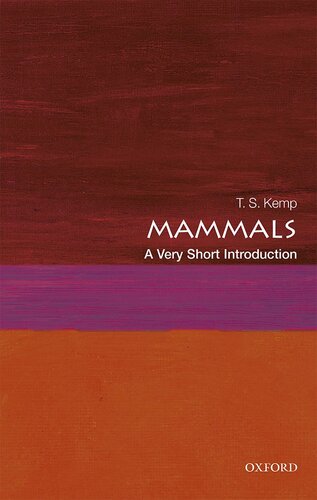

Most ebook files are in PDF format, so you can easily read them using various software such as Foxit Reader or directly on the Google Chrome browser.
Some ebook files are released by publishers in other formats such as .awz, .mobi, .epub, .fb2, etc. You may need to install specific software to read these formats on mobile/PC, such as Calibre.
Please read the tutorial at this link: https://ebookbell.com/faq
We offer FREE conversion to the popular formats you request; however, this may take some time. Therefore, right after payment, please email us, and we will try to provide the service as quickly as possible.
For some exceptional file formats or broken links (if any), please refrain from opening any disputes. Instead, email us first, and we will try to assist within a maximum of 6 hours.
EbookBell Team

4.4
42 reviewsMany species are still small, and follow the lifestyle of the ancestor, but others have adapted to become large grazers and browsers, like the antelopes, cattle, rhinos, and elephants, or the lions, hyaenas, and wolves that prey upon them. Yet others evolved to be specialist termite eaters able to dig into the hardest mounds, or tunnel creating burrowers, and a few took to the skies as gliders and the bats. Many live partly in the water, such as otters, beavers, and hippos, while whales and dugongs remain permanently in the seas, incapable of ever emerging onto land.
In this Very Short Introduction T. S. Kemp explains how it is a tenfold increase in metabolic rate - endothermy or "warm-bloodedness" - that lies behind the high levels of activity, and the relatively huge brain associated with complex, adaptable behaviour that epitomizes mammals.
He describes the remarkable fossil record, revealing how and when the mammals gained their characteristics, and the tortuous course of their subsequent evolution, during which many bizarre forms such as sabre-toothed cats, and 30-tonne, 6-m high browsers arose and disappeared. Describing the wonderful adaptations that mammals evolved to suit their varied modes of life, he also looks at those of the mainly arboreal primates that culminated ultimately in Homo sapiens.
ABOUT THE SERIES: The Very Short Introductions series from Oxford University Press contains hundreds of titles in almost every subject area. These pocket-sized books are the perfect way to get ahead in a new subject quickly. Our expert authors combine facts, analysis, perspective, new ideas, and enthusiasm to make interesting and challenging topics highly readable.